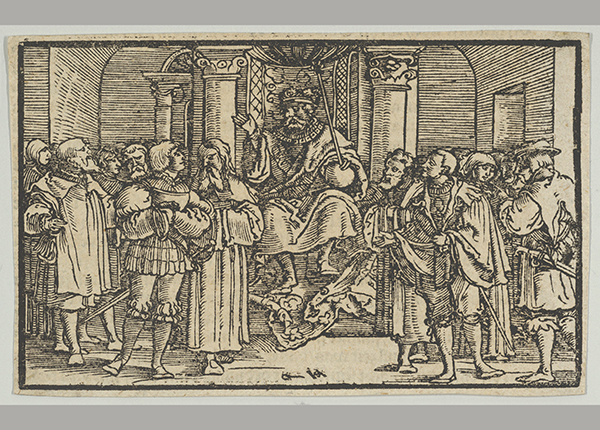Historic Document
The War between the Athenians and the Peloponnesians (ca. 431-400 BC)
Thucydides | ca. 431-400 BC

The Metropolitan Museum of Art, New York, Gift of Harry G. Friedman, 1962
Summary
Thucydides son of Olorus (ca. 460-400), was the author of The War between the Athenians and the Peloponnesians. Thucydides was the scion of a prominent and wealthy Athenian family, who served briefly during the war he describes before being banished. Highly educated Americans had studied Thucydides’s history in school and at college. In the period between 1776 and 1800, the Founding generation was especially interested in the successes and failures of the classical republics of Ancient Greece and Rome. They hoped to succeed where the ancients had failed. They turned to Thucydides for guidance about the defects of the classical republics. No passage did they find more striking than his discussion of faction at Corcyra and elsewhere and of the descent of that and other Greek cities into civil war.
Selected by

Paul Rahe
Professor of History and Charles O. Lee and Louise K. Lee Chair in the Western Heritage at Hillsdale College

Jeffrey Rosen
President and CEO, National Constitution Center

Colleen A. Sheehan
Professor of Politics at the Arizona State University School of Civic and Economic Thought and Leadership
Document Excerpt
3.82
Afterwards all Greece, as a man may say, was in commotion; and quarrels arose everywhere . . . . Now in time of peace they could have had no pretence nor would have been so forward to call them in; but war and confederates to be had for either party, both to hurt their enemies and strengthen themselves, such as desired alteration easily got them in. And many and heinous things happened in the cities through this sedition, which though they have been before and shall be ever as long as human nature is the same, yet they are more calm and of different kinds according to the several conjunctures. For in peace and prosperity as well cities as private men are better minded because they be not plunged into necessity of doing anything against their will. But war, taking away the affluence of daily necessaries, is a most violent master and conformeth most men’s passions to the present occasion. . . . For inconsiderate boldness was counted true-hearted manliness; provident deliberation, a handsome fear; modesty, the cloak of cowardice; to be wise in everything, to be lazy in everything. . . . In brief, he that could outstrip another in the doing of an evil act or that could persuade another thereto that never meant it was commended. . . . For these societies were not made upon prescribed laws of profit but for rapine, contrary to the laws established. And as for mutual trust amongst them, it was confirmed not so much by divine law as by the communication of guilt. And what was well advised of their adversaries, they received with an eye to their actions to see whether they were too strong for them or not, and not ingenuously. To be revenged was in more request than never to have received injury. And for oaths (when any there were) of reconcilement, being administered in the present for necessity, were of force to such as had otherwise no power; but upon opportunity, he that first durst thought his revenge sweeter by the trust than if he had taken the open way. For they did not only put to account the safeness of that course but, having circumvented their adversary by fraud, assumed to themselves withal a mastery in point of wit. And dishonest men for the most part are sooner called able than simple men honest, and men are ashamed of this title but take pride in the other.
The cause of all this is desire of rule out of avarice and ambition, and the zeal of contention from those two proceeding. For such as were of authority in the cities, both of the one and the other faction, preferring under decent titles, one, the political equality of the multitude, the other, the moderate aristocracy, thought in words they seemed to be servants of the public, they made it in effect but the prize of their contention; and striving by whatsoever means to overcome both ventured on most horrible outrages and prosecuted their revenges still farther without any regard of justice or the public good, but limiting them, each faction, by their own appetite, and stood ready, whether by unjust sentence or with their own hands, when they should get power, to satisfy their present spite. So that neither side made account to have any to have anything the sooner done for religion [of an oath], but he was most commended that could pass a business against the hair with a fair oration. The neutrals of the city were destroyed by both factions, partly because they would not side with them and partly for envy that they should so escape.




